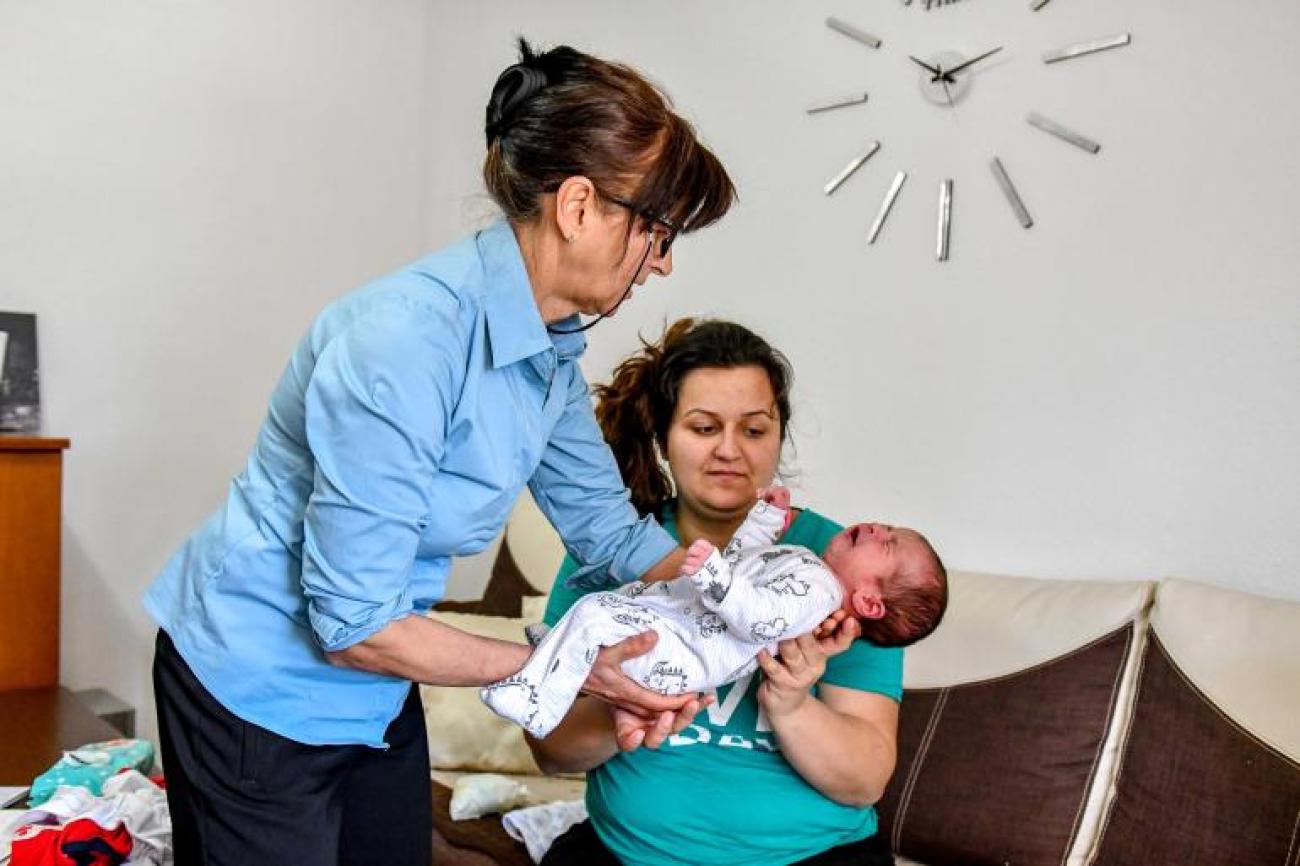Quality patronage services are at the core of preventive health care

New functional assessment examines the organization and human capital aspects of the home visiting service in Skopje Health Center
Skopje, 23 June 2022: The main findings of a UNICEF commissioned functional assessment of the home visiting service in Skopje show that the patronage service will benefit from improved efficiency to adequately respond to the needs of families and children.
The report highlights the need for clear professional standards, protocols and job description, digital support to all patronage services, improved cross-sectoral cooperation, professional development opportunities and continuous professional training to serve the families with children beyond health and growth checkup.
Health professionals from primary health care institutions, representatives of the Ministry of Health and UNICEF gathered today to validate the findings and discuss way forward including development of an Improvement Plan. Considering that this analysis is based on the functions of the institution, the recommendations can be replicated to the patronage service in the other parts of the country.
“The benefits of proper care in the first phase of child’s life are life-saving and life-lasting. This is why having motivated, trained and well-organized patronage nurses is crucial, not only in helping families with advice on health, growth and physical development, but also in supporting them develop skills in positive parenting and building secure attachment,” said Patrizia DiGiovanni, UNICEF Representative.
“The Ministry of Health welcomes the finding of the functional analysis of the home visiting service and the recommendations to strengthen their role so that we can establish a support system to respond to the current challenges and improve the services in the years to come,” said Nermina Fakovic, Head of Preventive Health Care Department in the Ministry of Health.
Currently, the average age structure of the employees in the polyvalent patronage service is 50-60 years, which means that in the next 5-7 years a large part of the staff will meet the conditions for retirement and the number of patronage nurses will be significantly reduced. Without intensified efforts to motivate young staff to join, the sustainability of the polyvalent patronage will be put in question, highlights the report.
Furthermore, medical nurses graduating at the high medical school lack both theoretical and practical knowledge on patronage work because patronage is not included in the school teaching subjects and in the internship opportunities. To help newly graduated medical nurses gain the knowledge and experience, the functional analysis recommends introducing workplace based mentoring system.
The home visiting service should go beyond checking health and growth status of children. The report highlights that system collaboration with other institutions needs improvement. Inter-sectoral linkages of primary health care services with child protection and education sectors can help identify and address developmental delay, disability, violence and neglect.
More specifically, the collaboration with the Centers for Social Work, in the context of sharing information and data, can help prevent violence and neglect and dysfunctional parenting, and the collaboration with professionals working on early detection and early intervention of developmental delays, can help provide timely support to families of children with disabilities.
The assessment also noted the urgent need to make the processes digital and linked to “Moj termin” in all patronage nurses’ units in the country. Although the recording and reporting system is digitalized and modules incorporated in the e-health system, lack of IT resources still poses a challenge to its universal utilization, with only 60% patronage nurses using it.
Digitalization is very important as it improves the collection of real-time data on pregnant women and newborns for the patronage service needs, helps health workers get access to patient health records and general social status data of the family before home visit. It also allows entering digital reports on family visits and sharing other cross-referencing data with other institutions.
It is expected that the findings will inform the wider legal framework regulating the work of the patronage service and will help address the challenges such as lack of regulations and tools to standardize the patronage nurse practice.
The research was commissioned by UNICEF and the European Commission Directorate-General for Neighbourhood and Enlargement Negotiations and was conducted in partnership with the Center for Change Management and Skopje Health Center.
The activity is part of the broader support UNICEF and the European Commission Directorate-General for Neighbourhood and Enlargement Negotiations provide under the two-year initiative to strengthen national health, education, early childhood development, and child protection systems to ensure continuity in the provision of core services for vulnerable children and their families in the immediate and the longer-term recovery response to COVID-19 in the countries of Western Balkans and Turkey.

